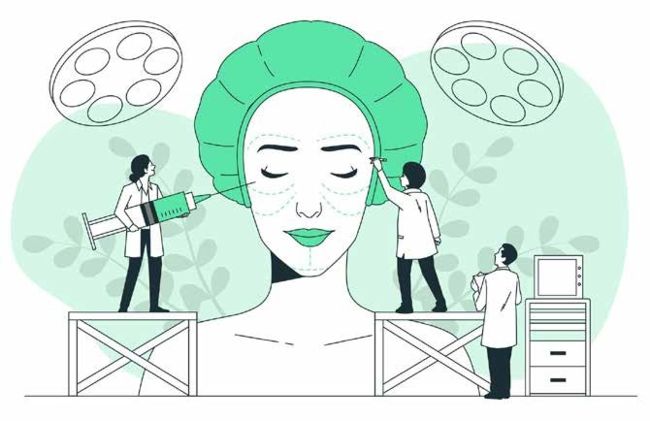Aesthetic Boundaries
Shriyal Sethumadhavan connects with dermatologists to understand how will minimum standards shape India’s dermatology and aesthetics landscape.

The Indian government has set upon a pivotal initiative aimed at establishing definitive benchmarksf or the operation of skin, hair, and cosmetology clinics across the nation. With a focus on ensuring quality healthcare services in the realm of dermatology and cosmetology, this endeavour seeks to define minimum standards that clinics must meet to guarantee the delivery of safe and effective treatments. This groundbreaking move underscores the government’s commitment to enhancing the standards of care in these specialised medical sectors, acknowledging the significance of regulating practices in skin and hair clinics. By outlining comprehensive guidelines, this initiative aims to set a uniform framework for clinics, fostering accountability and elevating the overall quality of services rendered to patients seeking dermatological and cosmetological treatments. Such regulatory measures not only ensure patient safety but also facilitate a more transparent and structured landscape for practitioners and clinics alike. This proactive step underscores a concerted effort to address the evolving healthcare needs in the field of dermatology and cosmetology, aligning with broader objectives to improve healthcare accessibility and standards across the country.
We reached out to experienced dermatologists for their take on how the establishment of minimum standards for skin, hair, and cosmetology clinics by the government impacts the quality of care and patient safety within the dermatology and aesthetics industry.
Dr Abhishek De, Senior Consultant, WIZDERM Skin and Hair Clinic, Kolkata, and Associate Professor, Calcutta National Medical College “I find it to be a very welcome move by the government. Over the last decade, in the name of aesthetic practice, we have witnessed widespread quackery and the use of unproven and dangerous pseudoscientific methods by unskilled or inadequately trained individuals. The resulting impact on society includes the generation of unrealistic and overtly racist trends like ‘whitening treatment’, along with treatment-induced infections and dismal outcomes in various skin procedures.

Pseudo-institutions claiming to offer degrees or certifications in cosmetology, trichology, and aesthetic medicine have emerged, breeding numerous quacks. They often mislead even graduate or postgraduate doctors into believing these institutes are legitimate. These institutes lack legitimate authority to run courses and serve as the primary creators of quackery in aesthetic medication. Furthermore, there are advertisements, especially through social media, promoting unproven or dangerous procedures. YouTubers or Instagram influencers, paid by non-dermatologist institutes, generate false claims of miracles to attract patients and revenue. These channels need to be scrutinised, and their conflicts of interest verified.
I hope this initiative will raise awareness among the general population and foster a collective understanding about choosing the right person, institute, product, and procedures for their skin and hair issues. Implementing any rule in a large and complicated country like India poses challenges. However, this government move represents a welcome first step towards the much larger goal of eradicating quackery from the aesthetic sciences and procedural dermatology.”
Dr Madhuri Agarwal, Founder &CEO, Yavana Aesthetics Clinic, Mumbai “The government’s initiative to establish quality standards for the minimum requirements is a fantastic idea, especially given the unchecked and unlicensed practices prevalent in India, particularly in dermatology. While we, as board-certified dermatologists, witness numerous other specialties and even non-doctors claiming to be dermatologists, this trend significantly impacts the knowledge base. Wrong practices proliferate, tarnishing the technology and detrimentally affecting the entire business landscape. The unsupervised and unchecked growth of these practices in India is concerning.
With the government’s introduction of checks and balances, this move is commendable and muchneeded. It is likely to curb these wrong practices, benefiting consumers by enabling them to access the right doctors across all fields and receive appropriate treatment. Ensuring hygiene and treatment safety will significantly impact India’s healthcare sector overall.
In dermatology, this holds immense significance. Both clinical and aesthetic dermatology will be safeguarded with minimal practices and careful oversight. Streamlining processes will allow us to practice with the right tools, providing patients with the desired results. This will bolster patient confidence not only in their doctors but also in different technologies, encouraging treatments in a safe environment.”


Dr Gulhima Arora, Senior Consultant and Director, Mehektagul Dermaclinic, New Delhi “This is a sign of relief. I believe it is one of the best steps taken by the government to ensure better quality patient care and establish the minimum standards required for aesthetics and dermatology. To some extent, it will eliminate the misconceptions and misguided information that surround dermatology and skincare on social media. There is an abundance of misinformation that needs sorting out, and this government initiative is a great step toward that. It also helps in creating better awareness. With the government’s effort, we can prevent the rampant sale of any kind of over-the-counter drugs that might be misused, such as topical steroids. Many chemists prescribe topical steroids to treat fungal infections, for instance, leading to widespread resistance of the organism in the community. This makes it difficult for normal anti-fungal drugs to act on the condition. Adermatologist serves as the best consultant for skin, hair, and nails. With the government’s approach, patients would be in safer hands. If a cosmetic procedure is performed by a dermatologist, they also know how to manage complications should they occur. Unlike quacks who perform these treatments, causing complications and lacking the ability to manage them effectively, dermatologists can help restore normal skin in case of issues. Therefore, it is a win-win situation for both doctors and patients, and a welcomed approach by the government.”

Dr Geeta Patel, Dermatologist, Zahra Skin and Laser Clinic, Ahmedabad “Establishing minimum standards for skin, hair, and cosmetology clinics could inadvertently lower the overall quality of these establishments. In simpler terms, it means individuals lacking adequate qualifications might gain entry and perform procedures they otherwise would not be capable of. This scenario allows those with subpar skills to work on a critical area of the human body – the face. Consequently, patients may experience unsatisfactory outcomes and errors due to incompetence or limited capabilities. This breach of trust in physicians can lead to irreversible damages and potential lawsuits. Such occurrences not only harm individual patients but also tarnish the reputation of the dermatology and aesthetic industry as a whole. Safety and quality are inevitably compromised because similar to other medical fields, this industry demands a certain level of intelligence and dedication. These qualities reflect in the outcomes experienced by patients.”
